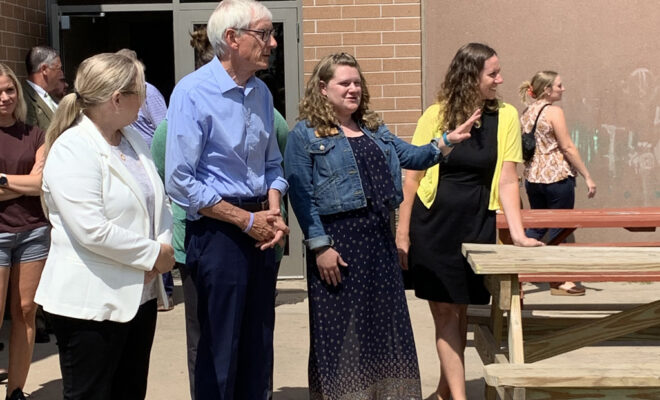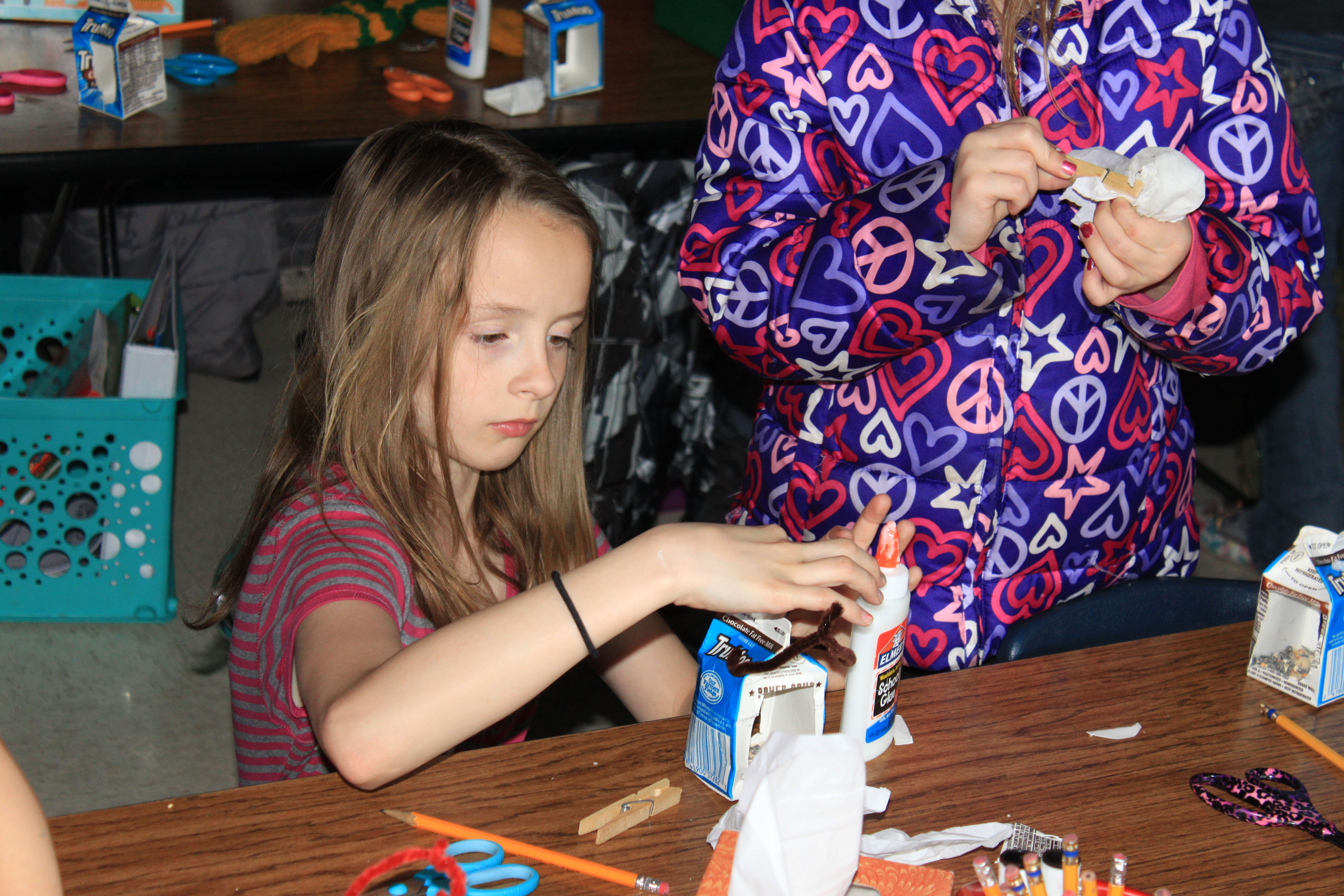Governor ‘hopeful’ special session brings workforce, childcare relief

From left, DWD Secretary Amy Pechacek, Gov. Tony Evers, and far right, DCF Secretary Emilie Amundson listen as YMCA school age childcare director Abbie Cline talks about the Y’s summer day camp program. Star Journal photos
Evers stops in Rhinelander, tours YMCA
By Eileen Persike, Editor
RHINELANDER – Referencing Wisconsin’s $4 billion state surplus, Gov. Tony Evers is calling the Wisconsin Legislature back for a special session next month to address what he said are “chronic workforce issues” left off the 2023-25 biennial budget.
He is proposing a $1 billion package that would include creating a paid family and medical leave program, investing in higher education, and strengthening workforce sectors including healthcare and education. But at the top of the list, Evers said, is investing $350 million to support childcare workers and families with small children.

Department of Workforce Development Secretary Amy Pechacek and Department of Children and Families Secretary Emilie Amundson joined Evers last week as he toured the YMCA of the Northwoods to learn about the Y’s summer day camp.
“It is exceedingly important that we do this, yes, it’s the right thing to do – these people and others across the state area able to tell you how important it is to have our smallest kids learning the right things,” Evers said. “All sorts of good educational reasons to do it, but if you are thinking of it from a workforce point of view, it is all about, if we want people in the workforce, we’re going to have to provide the best resources to have their kids taken care of while they’re working.”
Over $330 million has been awarded since May 2020 to Wisconsin child care providers through the Child Care Counts program with federal COVID relief funding. That funding is set to expire in January. The Governor said if assistance is not continued, child care facilities will have to close their doors or raise rates.
“We can’t afford to lose workers,” added DWD Secretary Pechacek. “Demographic trends have been in the making for decades; low birth rates for generations, baby boomers retiring, net-zero or negative in-migration to the state of Wisconsin. All of that means there are more available jobs in Wisconsin than there are actual workers to fill them. Without providing the support behind the workforce, we will be hampering the record breaking momentum we’ve had and our economic recovery under Gov Evers’ leadership.”

YMCA of the Northwoods CEO Linda May said receiving financial support is paramount. The Child Care Counts funding has allowed the Y to increase staff salaries and offer a full benefit package to childcare workers.
“We’ve been able to keep increases at bay and we’ve been able to offer our staff full benefits because of that support,” said May. “Now when that departs in January, we are saying to our parents, you have to pick up the full burden. They’re already experiencing 20-30% of their income on childcare, which is unconscionable.”
Y ‘high quality program’
After the tour, DCF Secretary Amundson said what she saw was a “really high quality program” staffed with trained educators who provide high quality care.
“Child Care Counts has helped to create an environment where these educators can be paid the kind of wage that will keep them here at the center,” said Amundson. “If that or a program like it goes away, those fees have to go somewhere. They get passed down to parents or the child care center has to make difficult decisions about closing classrooms, extending those waiting lists or frankly, closing their doors altogether. That’s what we’re trying to avoid with this special session.”
Speaker Robin Vos (R-Rochester) released a statement about Evers’ special session, saying it is “nothing more than a rehash of Tony Evers’ tax and spend budget.” Vos said the child care payment proposal is a “12-month patch” to make up for losing the federal stimulus plan.
“It is unsustainable and does nothing to address the long-term problem faced by the childcare industry.”
Instead, he said Republicans made the decision to return the budget surplus to taxpayers through a tax cut.
“Our priority when we return in September will be to give Gov. Evers another chance to fix his mistake by signing a middle-class tax cut,” Vos wrote.
“A lot of this is politics, but I do know that Republicans do care about having a good available workforce,” said Evers. “And this will be something that, if we don’t do it right, we will have fewer people and our economy will suffer. Frankly, we’re giving them the chance to come to the plate and take a whack at this. Democrats are on board on this, [Republicans] used to be on board with this. If we fail this time around, it’s on them. A lot of people, who are “them” I am talking to now.”
Looking at the numbers

– In Oneida County, May said there is an 800-child gap for childcare and after school care is even more of a rarity. As the nation’s largest provider of child care in the country, May said the Y is being asked to do more.
“I will tell you that I am approached by rural communities, since I’ve been here, and they are looking for the Y to come in and open child care centers and support the gap,” May said.
– Childcaredeserts.org defines a childcare desert as any census tract with more than 50 children under age five that contains either no childcare providers, or so few options that there are more than three times as many children as licensed child care slots.
– The Wisconsin Department of Children and Families website shows there are currently 13 licensed childcare centers in Oneida County, with a total capacity of 663 children – including 120 summer slots for the Y’s day camp. Three of those facilities are in the Lakeland area and one is in Three Lakes; the other nine are in Rhinelander.
– According to a report from the Century Foundation, without continued financial support, 2,110 childcare programs in the state are projected to close, resulting in more than 87,000 children without child care in the state and the loss of over 4,880 child care jobs. Further, the report indicates the lack of access to child care could impact Wisconsin’s economy by half a billion dollars in lost revenue.
Leave a reply
You must be logged in to post a comment.




